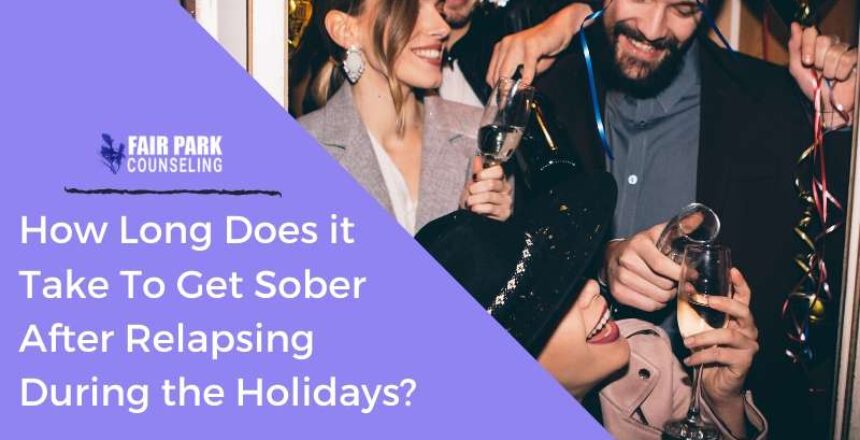A large number of people find themselves experiencing a relapse over the holiday season. Has the hectic nature of the season created a perfect storm of triggers for you? If you started drinking again worry not. Wondering how long does it take to get sober again after a relapse is a normal thing.
This situation can make you feel panicked or frustrated or overwhelmed. While this is understandable, try not to get down on yourself. Don’t allow these feelings of disappointment to keep you stuck in your addiction. You can start again and set yourself up for success.
No matter how far into recovery you are or how often you have relapsed, Fair Park Counseling can help.
Don’t Despair. Pick Yourself Up and Move Forward.
For some people in recovery, relapsing is their greatest fear. And if it happens to you, you may be feeling a wide range of emotions:- Anger
- Sadness
- Frustration
- Depression
- Loneliness
- Despair
- A sense of being lost
- Failure
How Long Does It Take to Get Sober Again?
So exactly how long does it take to get sober after relapsing? There is no set number of required days or weeks to get sober after relapsing. Once there is no alcohol in your system, and you choose not to drink, you are getting sober. You start with one minute of sobriety and go from there. This process of starting over looks different for everyone. Googling, “how long does it take to get sober again” is the wrong mindset. Focus on taking the important steps so you achieve sobriety again. Anyone who has a drug or alcohol addiction knows for certain that the road to recovery is full of obstacles, twists, and turns. Sobriety is not a one-size-fits-all process. One of the most common stumbling blocks is to experience a relapse, and they happen more frequently during the holidays. What is supposed to be the most wonderful time of the year is also a time of stress and poor health habits. For someone in recovery, this stress puts their sobriety at stake. While there is no set-in-stone timeline for emerging from a relapse, there are some steps you should take to get back on the road to recovery.Tell Someone
Don’t keep your relapse a secret. Although it is a disappointment to you, relapses do happen in recovery. About 40-60 percent of people in recovery will experience a relapse at some point during their sobriety. Experiencing a relapse can make you want to hide and isolate yourself. But isolation from the people who love and support you is not what you need. Feeling embarrassed or ashamed is common, and you may be wary of what friends and family will say or think. You fear their judgment. But it’s vital to move past these thoughts and seek the comfort and support your loved ones can provide. Reach out to your sponsor or someone close to you and let them know about your relapse. Others in recovery for addiction may have their own stories of relapse. Hearing the experiences of other people can help you work through and move past the negative feelings that accompany a relapse. Interrupting your sobriety with relapse can happen. If it does, get help immediately. The one thing you cannot do is keep it a secret. Your healing and recovery will occur in the community, not isolation. Use the help and support available to you. If you feel like you can’t tell anyone, at least reach out to an expert counselor to get back on track.Understand What Sets You Off
One of the most significant factors in maintaining your sobriety is identifying your triggers. This knowledge is especially critical over the holiday season. During non-holiday times, you can control much of your day and stick to a consistent routine. This consistency helps you stay sober. But all of the extracurricular activities that accompany the season can create extremely stressful scenarios for someone in recovery. It is often difficult to maintain a routine during the holidays, making it trickier to stick to your recovery plans and habits. This time of year is full of potential triggers for people in recovery:- Parties with alcohol flowing
- Seasonal Affective Disorder (SAD)
- Crowds and long delays
- Travel
- Family drama
- Disrupted sleep
Get Back Into a Recovery Program
Nothing is going to stop the relapse and get you back on the road to recovery other than working a program. If you are currently in a recovery program and experience a relapse, then you need to recommit. If you have yet to find a treatment or recovery program, then it’s time. Don’t try to do this alone. You have many options for getting help:- Inpatient care
- Outpatient care
- Intensive outpatient therapy
- Group sessions
Help Is a Phone Call Away
Remember that recovery is not a destination. It is a road that you will travel for the rest of your life. You will be navigating your sobriety through many more holiday seasons to come. Relapse is another challenge along that road. It’s a setback that you will have to face, but you do not need to face it alone. While a common question we get is how long does it take to get sober again, we want you focusing on getting sober, no matter the time frame. Reach out to Fair Park Counseling today for the help and support you need for your health and wellness. We are on your side.- Tags: holiday drinking

